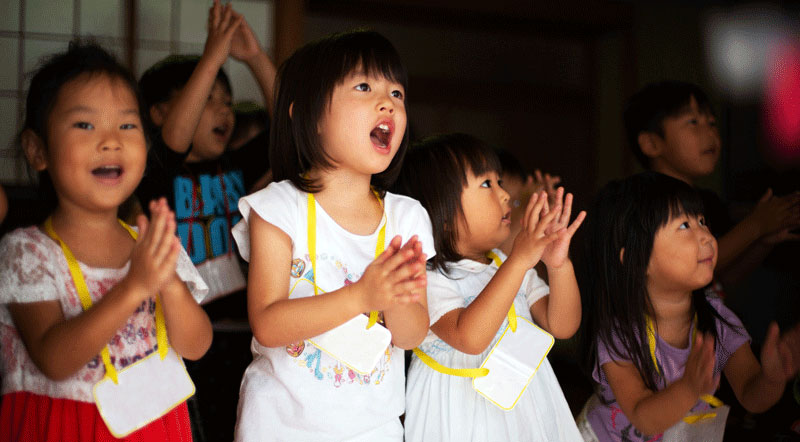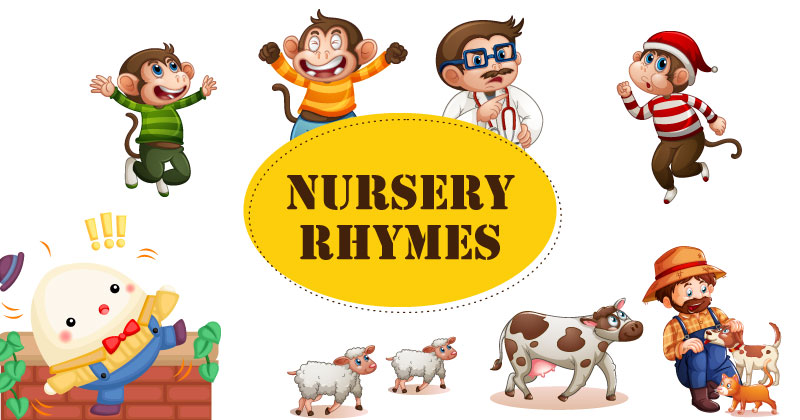The Importance of Nursery Rhymes In Early Childhood Learning
Join the bandwagon if you still remember the verses of famous nursery rhymes you learnt when you were probably 3 years old. How is it that you can still recite ‘Twinkle – Twinkle’ and ‘Humpty – Dumpty’ without event referring to the lyrics? Can nursery rhymes have such a great impact, that it gets etched in our permeant memories, even decades after schooling? Well, if you are of the belief what good can simple songs and rhymes do to your toddler & preschoolers, it’s time to read the full Blog and find out for yourself.
Nursery rhymes are referred to as short songs or verses, sung by the children or for the children. Nursery rhymes focus on a theme and have a particular tone or rhythm which makes it easy to remember. They are available in languages other than English. Regional nursery rhymes are equally famous and some of the popular Middle East/UAE Arabic children’s rhymes are Ada Deenoo and Ai’s Horse.
Some of these songs are intended to amuse children & entertain them, while others are devoted to provide educational value. Let us see what are the main benefits of including nursery rhymes in the preschool curriculum.
An Induction Before One Starts Reading Books
Children are pretty impatient and have less attention span. Imagine asking them to sit in one place while you read a story book out. Though you try ways and means of pestering them to listen patiently, your time & efforts might go vain. So, before you unravel a book, start by requesting Alexa on voice command to play any trending or classic nursery rhyme. When children hear songs though they may not be paying undivided attention, the tunes & lyrics echoes in the child’s mind and listening to the same rhymes over & over again, may stick in the child’s memory. When an adult now reads a book to the child, he will be able to associate words heard in the song to the words of the book and thus form connections or understanding. Hence, rhymes induct children into developing a love for reading.
Participating in Action Rhymes can Build Social Skills
Action rhymes are those where the teacher does some action and children mimic the same action. It includes body movement such as tapping shoulder, jumping, making facial expressions, and counting on fingers. While children are copying the actions they interact with their peers and may hold hands, give high5 to each other, and even shake a leg together. This helps break the ice, as preschoolers are yet getting to know each other. Forming meaningful social connections boosts bonds between classmates. Some examples of action rhymes are; Five Little Speckled Frogs, Here We Go Round The Mulberry Bush, and Wheels of The Bus.

Develop Vocabulary and Literacy Skills
We must be cautious while choosing the rhyme, because essentially you are introducing the toddler to a vast bank of words and vocabulary which they might soon use while talking & interacting with others. Reading Eggs presents some of the choicest collection of sing along rhymes through its Eggy Nursery Rhyme feature. Available in audio-video format, these 10 classic rhymes consists of colorful animations and catchy tunes, for an interactive learning experience. Children can even sing along with the karaoke feature and sync with the lyrics, to have some fun. The Reading Eggs App is quite popular amongst parents all over the world, especially when schools in Dubai and GCC Countries recommend it to them.
Introduction to Math Skills
Five Little Ducks, Here is a Beehive, The Ants to Marching, are all nursery rhymes that compel kids to count and announce the numbers out loud. In a sing – song way children learn to count and recognize numbers. This is a great activity to introduce pre-math counting and number identification skills. By repeating the lyrics over & over again, kids learn the sequence of number counting and ultimately become champs at it.
Better Self Expression
Children are like buds ready to be bloomed and only with the right nourishment & support do they flourish. Rhymes help children be more expressive, as they learn to speak, move, sing, dance, and have a good time while learning. Sometimes, the teacher encourages children to be creative come up with their own interpretation to the songs, thus giving them a chance to have their own creative expression.
Now that you agree with us on the positive benefits that nursery rhymes have on children, it is time to make it a bit more fun, by adding an element of excitement to the rhymes. We promise your children will be in for a treat and love you for making them sing along.






Recent Comments